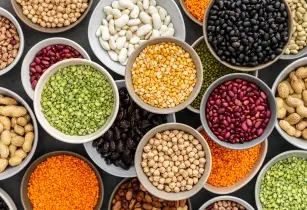FAO marked World Pulses Day 2023 with a virtual global gathering on 10 February, which featured opening remarks by the FAO director-general
This year’s theme 'Pulses for a Sustainable Future' highlighted how pulses are increasing the resilience of farming systems and improving lives, thanks to their low water footprint, drought tolerance and resistance to climate-related disasters. It also put a spotlight on the global pulses sector, and how it can be a positive driver in ensuring the resilience of regional and global supply chains, enabling consumers to access nutritious foods, and contributing to the sustainable use of natural resources in the production of pulses.
The first keynote speaker, Saadia Elmubarak Ahmed Daak, Alternate Permanent Representative of the Republic of the Sudan to FAO, explained that pulses are a huge part of Sudanese cuisine, with most smallholder farmers choosing to grow them due to their low requirement of fertilisers when compared to other crops. The second keynote speaker, Cindy Brown, president of the Global Pulse Confederation, urged participants to encourage the world to grow and eat more pulses, while the third speaker Jingyuan Xia, FAO director of the Plant Production and Protection Division, presented case studies on the benefits offered by pulses in the West Africa and Latin America regions, as well as countries like France and India.
Moreover, as the world continues to face significant challenges to food and nutrition security, such as transboundary pests and diseases, conflicts, and climate change effects, pulses can be an important part of the response, as they are an affordable, nutrient-dense food that can be stored for a long time. They also help in creating economic opportunities for smallholder farmers as they typically offer higher profit margins when compared to cereal grains.
Pulses are also a great source of nourishment for the soil due to their capacity to fix nitrogen from the air, and optimise the use of synthetic fertilisers, while combatting the effects of climate shocks, such as droughts or heavy rainfall. In addition, they can also help mitigate climate change by boosting the soil's ability to store carbon and by restoring poor and degraded soils. Pulses are also excellent sources of protein and fibre, while at the same time being low in fat. Beans, chickpeas and peas are the most well-known and commonly consumed types of pulses. However, there are several other lesser-known varieties around the world such as vetches, lupins, and Bambara beans, all beneficial for food security, nutrition, health, climate change, and biodiversity.
Therefore, as pulses support all dimensions of sustainability, including them in agrifood systems is key to achieving the Sustainable Development Goals (SDGs).





